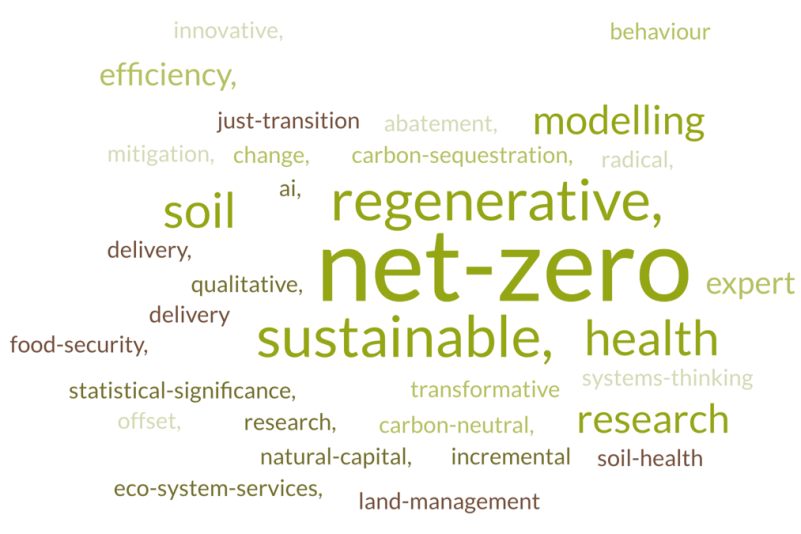From Problems to Pathways… The Language of Land Use

At this year’s Land Use for Net Zero, Nature and People (LUNZ) Big Tent event, participants were invited to consider the concept of ‘problematic’ language – those words or phrases that, rather than improving connectivity between and across different groups in the land use sector, are in fact a cause of disharmony – and a blockage to communication themselves.
To kick off the conversation, three examples were given of why certain words might be especially problematic:
- They are jargon – widely used by some communities but incomprehensible to others
- They are loaded with unintended interpretations
- They mean different things to different audiences and so create misalignment and confusion
Over the course of the day, almost one hundred words were suggested. They can be found in a Glossary here. Many of these were representative of the categories above – but others arose because they betray a particular mindset, attitude or perspective. As a starting point, we have organised them across 10 categories as follows:
- Vague: (Sustainable, Regenerative, Soil Health):
These are some of the most used words in the land use lexicon, and their universality is a major part of their appeal – and why they are problematic. By meaning all things to all users, their real-world application – especially as an aspiration – is nebulous. Do they refer to principles or outcomes? Are they a direction of travel or maintenance of the status quo? The devil is in the detail, and the detail is often lacking.
- Abstract: (Food security, Just Transition):
These terms are also accused of being vague – made worse by the fact that describe a outcome or a target – without a clear outline of what might underpins them. They disguise the fact that different stakeholders will employ very different goals, metrics and priorities to gauge progress.
- Patronising: (Natural Capital, Eco-system Services, Delivery, Land Management)
These are terms often used by policy-makers, NGOs, corporates and academics to describe farming – and the results of farming – but rarely by farmers themselves. They are considered abstract and reductive, condensing a complex process into a single (often monetizable) commodity. Responders described them as top-down, de-humanising and even triggering.
- Hierarchical: (Research, Expert)
These words arose because they imply (albeit subtly) a hierarchy of knowledge and abilities – putting certain skill and knowledge sets (generally academic) above others (lived experience). While there are a number of terms to describe specialists at one end of the spectrum (scientist, researcher, expert etc), at the other end there tends to be just one – the ‘farmer’ – often applied as a homogenous stereotype.
- Reductive: (Statistical significance, qualitative, incremental)
These terms are used – mainly by the research community to describe change. Like some of the terms above, they carry with them a sense of hierarchy – i.e. the ability to determine whether an action was measurably worthwhile or not- according to a very specific (probably limited) set of criteria. Because they are used more widely by those used to measure the change – rather than achieve it – they can be reductive, judgemental and divisive.
- Over-confident: (AI, modelling):
A critical challenge with these words is that they are used more by people that don’t understand them than those that do, and so carry with them a misplaced confidence in a (very general) technology solution to deliver results – often out of step with their potential. The blind faith in these solutions expressed by some stakeholders incurs fear in others.
- Simplification: (Carbon neutral, carbon sequestration, mitigation, offset, efficiency, abatement)
Many of these terms are used in the context of climate change and imply (to the general public especially) that the solution is obvious, straight-forward, and at hand. This gives a misleading impression of the scale of the challenge ahead.
- Threatening: (Behaviour Change, Transformative, efficiency, Innovative, Radical, systems thinking)
These are more ‘top-down’ phrases that refer to the nature and speed of change required to deliver the impact needed. While they might sound dynamic and bullish in a policy setting, to those required to carry them out – those whose future livelihoods are at stake – they come across as naïve, unrealistic, ignorant and even threatening.
9. Emotive: (Our, Just, Community, Natural)
These are also generalist terms that carry with them a particularly emotive resonance and so imply a fairness – a ‘sharing’ of the responsibility and the reward without explaining exactly what that they mean in practice. This makes them particularly easy to abuse – and disproportionately reassuring.
10. All of the Above: (Net Zero)
The biggest culprit of all – and for almost all the reasons listed above! Ambiguous, triggering, questionable from a technical/accounting perspective, unjust and highly politicised!
What became clear from this work is that the ‘problem’ is rarely with the word itself, but rather with the context it is used – the user, the audience, tone of voice, accompanying clarification or the platform.
In the next phase of this work, we will explore this context, and consider how different land use stakeholders can adapt this context – the way these terms are used to make them less problematic.

Matthew Orman
Communications
Subscribe to our Newsletter
A quarterly update of all LUNZ Hub activities, events and news stories.
